|
|
|
Sort Order |
|
|
|
Items / Page
|
|
|
|
|
|
|
| Srl | Item |
| 1 |
ID:
193065


|
|
|
|
|
| Summary/Abstract |
The two decades of war in Afghanistan left a mark on the American armed forces and redefined the American ways of war-making. One of this war’s legacies is the reimagining of the role of private military and security contractors in contemporary warfare. Due to the massive involvement of the private sector in the American war machine, this industry transformed from a marginal participant into a central partner. The privatization of military and security functions became a norm, an integral part of security architecture and military operation. In this study, I provide a brief review of this development and its implications.
|
|
|
|
|
|
|
|
|
|
|
|
|
|
|
|
| 2 |
ID:
165906
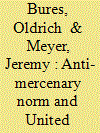

|
|
|
|
|
| Summary/Abstract |
This article offers an analysis of the influence of the anti-mercenary norm on the United Nations’ use of services provided by private military and security companies (PMSCs). It follows a constructivist approach which focuses on violations of the anti-mercenary norm within the UN system and on the justifications and condemnations of these violations in official UN documents. The findings suggest that while the anti-mercenary norm is no longer puritanical, two key aspects of the norm—the lack of a proper cause and the lack of control—remain influential within the UN system. Although all parts of the UN system nowadays routinely use a wide variety of services of PMSCs and the UN Secretary-General officially sanctioned security outsourcing in 2011, the UN continues to insist that it is only using PMSCs as a last resort, when no other options are available. The continuing need to justify the use of PMSCs’ services suggests that this practice challenges both the long-established identity of the UN as a key anti-mercenary norm entrepreneur and its ontological security.
|
|
|
|
|
|
|
|
|
|
|
|
|
|
|
|
| 3 |
ID:
186331


|
|
|
|
|
| Summary/Abstract |
This article introduces the Commercial Military Actor Database (CMAD), a dataset able to support research on civil war and commercial military actors. First, the CMAD covers all civil wars from 1980 to 2016 across all of the world’s regions except Europe, which enables the investigation of long-term regional and global trends. Second, the CMAD encompasses the corporate market segment and mercenary outfits, which facilitates the analysis of how those actors have impacted conflicts differently. Third, containing detailed information about the relationships behind exchanges, the CMAD allows users to disaggregate market exchanges. Using the CMAD’s new data, we examined trends in the market for force, and demonstrate the data’s added value. We re-examining Akcinaroglu and Radziszewski’s study on how private military and security companies affect the duration of civil war. The findings show that the market’s influence on conflict can only be fully understood by including corporate and mercenary actors.
|
|
|
|
|
|
|
|
|
|
|
|
|
|
|
|
| 4 |
ID:
142068
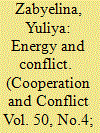

|
|
|
|
|
| Summary/Abstract |
Attacks on oil and gas infrastructures by terrorists and criminals in places like Nigeria, Colombia, Iraq and Russia have amplified the vulnerability of critical energy infrastructures (CEIs) to deliberate physical attacks. Being unable or unwilling to protect CEIs, many national governments have made attempts to alleviate these vulnerabilities through outsourcing of security, i.e. contracting the responsibility to protect CEIs out to non-state actors. This article advocates the need to conceptualize security outsourcing in the domain of critical energy infrastructure protection (CEIP) in order to explain a variety of regulatory choices made by governments in this domain. Based on a qualitative analysis of four case studies, the article discusses various types of security outsourcing in the protection of CEIs, including the militarization of national oil companies, public–private partnerships and the involvement of international organizations and local social groups. The typology may serve as a tool of describing, classifying and evaluating various forms of security outsourcing. The findings of the article help to deconstruct the complexity of security outsourcing and capture some of the major contemporary trends in energy security.
|
|
|
|
|
|
|
|
|
|
|
|
|
|
|
|
| 5 |
ID:
139489
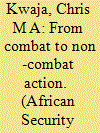

|
|
|
|
|
| Summary/Abstract |
This paper examines the rationale and centrality of private military and security companies (PMSCs) in humanitarian assistance operations in Sudan, asking why PMSCs are involved in humanitarian assistance operations in Sudan and what the principles underlying their activities are. To answer this question, the paper draws attention to the link between humanitarian crises and PMSC interventions. Where there is no meaningful alternative intervention, undergirded by humanitarian concerns that are also profit driven, PMSCs come in to provide the needed services. The protracted and complicated internal armed conflicts in Sudan, which have lasted for over two decades, have produced as many as 4,8 million internally displaced persons (IDPs) – the single largest number in the world. The kind of humanitarian assistance operations provided by PMSCs in Sudan have become critical to the provision of much-needed services which were inadequately provided by governmental authorities at both unilateral and multilateral levels. This paper argues that the humanitarian crises in Sudan created a regime that permits humanitarian assistance operations by both state and non-state actors.
|
|
|
|
|
|
|
|
|
|
|
|
|
|
|
|
| 6 |
ID:
165363
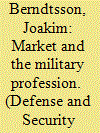

|
|
|
|
|
| Summary/Abstract |
The rise of private military and security companies (PMSCs) challenges our notion of military professionals. PMSCs bring new claims to professional status and legitimacy outside military institutions and represent an increasing diffusion of - and competition over - military and security expertise. In light of this development, understanding the formation of professional identities in military and private security organisations is as an important undertaking. This paper contributes to this endeavour by analysing professional self-images in the Swedish Armed Forces and how these relate to PMSCs. The study is based on data collected from official documents, semi-structured interviews and a small-scale survey among senior military officers. Focusing on military understandings of PMSCs and contractors, the analysis provides much-needed insight into relational aspects of professional identity formation outside the US context. Furthermore, it points to discrepancies in organisational and group levels in understandings of commercial security actors, and paves the way for future research.
|
|
|
|
|
|
|
|
|
|
|
|
|
|
|
|
| 7 |
ID:
161303
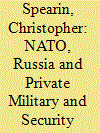

|
|
|
|
|
| Summary/Abstract |
In this article, Christopher Spearin examines Russian private military and security companies (PMSCs) operating in the so-called ‘grey zone’ and highlights their offensive character. Regarding a potential NATO response, the article contends that advancing an international normative stance such that PMSC employment should be viewed in an undeniable and defensive manner would be a positive approach.
|
|
|
|
|
|
|
|
|
|
|
|
|
|
|
|
| 8 |
ID:
110917
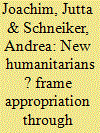

|
|
|
|
|
| Publication |
2012.
|
| Summary/Abstract |
Although private military and security companies (PMSCs) are gaining increasing importance, they still suffer from an image problem. In the media, they are frequently referred to as 'mercenaries' or 'dogs of war'. PMSCs are therefore interested in presenting themselves as legitimate and acceptable contract parties. Based on a discourse analysis of the homepages of select PMSCs and the industry association International Stability Operations Association (ISOA), and drawing on the framing literature, we examine one way in which companies respond to such negative labels. We show not only that PMSCs provide supplemental logistics or security for the staff of humanitarian organisations confronted with complex emergencies and ever-more dangerous missions, but also that these companies appropriate the humanitarian frame discursively, emphasising those elements that fit their interests and needs. To present themselves as 'new humanitarians', PMSCs employ primarily two kinds of strategies: naming and forging alliances with more traditional humanitarian actors. Their growing involvement in this field may not be without consequences and may contribute to the blurring of lines between military and civilian missions.
|
|
|
|
|
|
|
|
|
|
|
|
|
|
|
|
| 9 |
ID:
119998
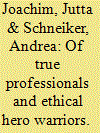

|
|
|
|
|
| Publication |
2012.
|
| Summary/Abstract |
Private military and security companies (PMSCs) have gained increasingly in importance over the course of the past two decades. Yet, given the intransparency of the industry and the heterogeneity of the companies that comprise it, we thus far know little about the actors involved. In this article, we offer preliminary insights into the self-representation of PMSCs, based on a gender-discourse analysis of the homepages of select companies and their main professional associations. We argue that survival in an increasingly competitive industry not only hinges on size, market share or effectiveness, but is also inherently gendered. PMSCs and their associations draw on the one hand on civilized and accepted forms of masculinity and femininity, presenting themselves as 'highly skilled professional' military strategists and ordinary businesses akin to banks or insurance companies. At the same time, however, PMSCs also engage in strategies of (hyper)masculinization and pathologization to set themselves apart from mercenaries, their private competitors and state security forces. In this respect, companies appear to view themselves as 'ethical hero warriors'. Whether intended or not, their strategies have political consequences. Within the security industry, they contribute to the creation and maintenance of a norm regarding what constitutes a legitimate PMSC, to which more or less all companies strive to adhere. Vis-à-vis other security actors, these strategies seek to establish PMSCs as being superior because, unlike these actors, such companies are super-masculine and able to live up to the growing and sometimes contradictory demands of changing security contexts.
|
|
|
|
|
|
|
|
|
|
|
|
|
|
|
|
| 10 |
ID:
160905


|
|
|
|
|
| Summary/Abstract |
Italy has traditionally been wary of private providers of security. Still, private military and security companies (PMSCs) have recently started to play an important role in protecting Italian merchant vessels, eventually replacing the military vessel protection detachment units (VPDs) provided by the Italian Navy. Drawing on neoclassical realism, the increasing involvement of PMSCs in protecting Italian merchant ships is presented as an attempt to reduce the political costs associated with the use of military personnel abroad, epitomised by the arrest of two Italian Navy fusiliers by Indian authorities in February 2012.
|
|
|
|
|
|
|
|
|
|
|
|
|
|
|
|
| 11 |
ID:
179932
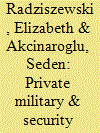

|
|
|
|
|
| Summary/Abstract |
PMSC training has the potential to improve state capacity, reduce the combatants’ opportunity and willingness to fight, and prolong the duration of peace. However, the benefit of PMSC training-related intervention over other types of PMSC interventions depends on the level of conflict complexity. Analysis of novel data on PMSC interventions and peace episodes following major/minor civil wars (1990–2008) shows that in cases when PMSCs intervene, training makes a positive contribution to peace in wars with a limited number of rebel groups that do not resort to terrorism. Positive impact dissipates in conflicts with greater levels of rebel fragmentation and terrorist tactics.
|
|
|
|
|
|
|
|
|
|
|
|
|
|
|
|
| 12 |
ID:
187341


|
|
|
|
|
| Summary/Abstract |
Using the current conflict in northern Mozambique as a case study, we argue that the South African government and its current legislation on private military and security companies (PMSCs) has prevented it from being a more effective agent for peace in the region. South Africa’s current legislation – the Foreign Military Assistance Act of 1998 (FMA) and the Prohibition of Mercenary Activities Act of 2006 (PMA) – creates a situation, a deliberate and intentional one, where PMSCs are unable to operate effectively effectively. Therefore PMSCs do not operate from South Africa, despite South African PMSCs being well regarded and experienced internationally. The FMA and PMA also oppose a general international trend which is seeing increased use and acceptance of PMSCs. We argue that the conflict in northern Mozambique is an example where legislation which is more accepting of the PMSC industry would have allowed South Africa to provide more (and earlier) assistance to Mozambique. This would have helped Mozambique and the region, but, importantly, it would also have been a valuable tool in South Africa’s foreign diplomacy and projected the potential for the use of smart power.
|
|
|
|
|
|
|
|
|
|
|
|
|
|
|
|
| 13 |
ID:
103773
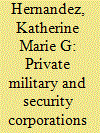

|
|
|
| 14 |
ID:
128612
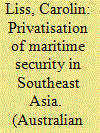

|
|
|
|
|
| Publication |
2014.
|
| Summary/Abstract |
This paper examines the involvement of new modes of governance (NMoG)/new actors, in establishing new regional regulatory frameworks in Southeast Asia. The basis for this discussion is a framework suggested by Kanishka Jayasuriya who argues that the activities of NMoG can facilitate the establishment of such regional regulatory frameworks. Concentrating on maritime services provided by one new actor, Private Military and Security Companies (PMSCs), this paper suggests that the current activities and working practices of PMSCs in Southeast Asia are more likely to undermine regional security cooperation and regional governance, thus challenging some of the tenets of Jayasuriya's framework.
|
|
|
|
|
|
|
|
|
|
|
|
|
|
|
|
| 15 |
ID:
134402
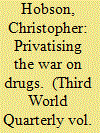

|
|
|
|
|
| Summary/Abstract |
A defining feature of the ‘9/11 wars’ has been the prominent role played by private military and security companies (pmsc). The growth of this market for military and security services has not gone unnoticed. Yet the role pmsc have played in supporting the US-led war on drugs has largely gone under the radar, both literally and figuratively. The aim of this article is to look at the activities of pmsc funded by the USA in Latin America, and to consider the specific consequences that arise from employing them in the field of counter-narcotics. It is argued that the use of pmsc further entrenches a costly and unsuccessful way of dealing with drugs. There is a need to move from a strict prohibitionist stance and consider alternatives to the war on drugs approach, but the use of pmsc creates another strong vested interest in maintaining an increasingly problematic and costly status quo.
|
|
|
|
|
|
|
|
|
|
|
|
|
|
|
|
| 16 |
ID:
167191
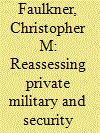

|
|
|
|
|
| Summary/Abstract |
This paper challenges recent claims that competitive market dynamics incentivize Private Military and Security Companies (PMSCs) to fully commit to providing effective services, thereby reducing the duration of civil war. Our assessment of a most-likely case scenario for this argument – Sierra Leone – reveals four critical problems. First, there is rarely direct competition, even if numerous companies are present. Second, the presence of multiple PMSCs usually represents a collaboration among subsidiaries providing distinct services, often under the same corporate umbrella. Third, data aggregation obfuscates the overlap of PMSC presence, inflating the amount of perceived competition. Finally, we raise concerns regarding how quantitative analyses can conflate conflict intensity with conflict termination.
|
|
|
|
|
|
|
|
|
|
|
|
|
|
|
|
| 17 |
ID:
179279
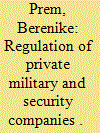

|
|
|
|
|
| Summary/Abstract |
This article studies the limitations of multi-stakeholder initiatives (MSIs) relating to Private Military and Security Companies (PMSCs). It draws attention to three distinct ways in which power operates in and around MSIs: rules, structural positions, and discourses. Based on an analysis of two MSIs, it shows that these governance initiatives strengthen the perspectives of stakeholders that consider PMSCs as normal and legitimate security actors. Western governments and like-minded actors have used the Swiss Initiative and the International Code of Conduct for Security Service Providers to bypass the less privatization-friendly process in the United Nations. MSIs equally perform an important legitimizing function for PMSCs through their discourses and practices. Finally, participants of the MSIs have relegated critical voices, weakening their ability to partake in governing the PMSC industry. By studying the limitations of MSIs through a power-analytical lens, this article therefore points at an important but overlooked dimension.
|
|
|
|
|
|
|
|
|
|
|
|
|
|
|
|
| 18 |
ID:
140111


|
|
|
|
|
| Summary/Abstract |
Although the privatisation of military support is increasingly widespread, advanced military organisations have not relied on Private Military and Security Companies (PMSCs) to the same degree. The existing scholarship on PMSCs cannot explain why countries sharing similar material incentives and similar market and political ideologies like the United States and the United Kingdom have not outsourced the same operational tasks. This article contends that introducing military role conceptions as a factor enabling or inhibiting the outsourcing of certain functions provides important insights into the scope of military privatisation, explaining why the US military has systematically privatised armed security and foreign military training, while the UK military has not
|
|
|
|
|
|
|
|
|
|
|
|
|
|
|
|
| 19 |
ID:
193102
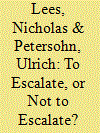

|
|
|
|
|
| Summary/Abstract |
The existing literature is unclear about whether private military and security companies (PMSCs) are a cause of increased conflict severity, or rather are simply hired within more severe conflicts. We argue that PMSCs do increase conflict severity, yet this is the result of an escalation strategy by states to regain territory from rebels. If contracted, PMSCs either substitute for host nation forces, or free up such conventional forces to engage in offensive operations. In both cases the conflict severity increases substantially. This argument is tested with OLS regression using data from 30 weak states from 1990 to 2007.
|
|
|
|
|
|
|
|
|
|
|
|
|
|
|
|
| 20 |
ID:
120309


|
|
|
|
|
| Publication |
2013.
|
| Summary/Abstract |
Private military and security companies' (PMSCs) relationship with state actors has received significant scholarly attention; their interaction with other private actors such as humanitarian non-governmental organisations (NGOs) has remained largely neglected. This article looks at the evolving relationship between NGOs and PMSCs in three parts. First, it assesses the current state of NGO-PMSC interaction. Two aspects stand out: contracting and conflict. By drawing on existing research on different forms of inter-cultural cooperation such as military-military and humanitarian-military cooperation, the second part of the article will show that conflict between PMSCs and NGOs can inter alia arise from their differing backgrounds, mandates, approaches to security, and short- and long-term goals. By looking at both differences and similarities between the two actors, the third part of the article will sketch out possible pathways for the future.
|
|
|
|
|
|
|
|
|
|
|
|
|
|
|
|
|
|
|
|
|